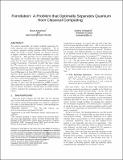| dc.contributor.author | Aaronson, Scott | |
| dc.contributor.author | Ambainis, Andris | |
| dc.date.accessioned | 2015-11-02T19:43:04Z | |
| dc.date.available | 2015-11-02T19:43:04Z | |
| dc.date.issued | 2015-06 | |
| dc.identifier.isbn | 9781450335362 | |
| dc.identifier.uri | http://hdl.handle.net/1721.1/99662 | |
| dc.description.abstract | We achieve essentially the largest possible separation between quantum and classical query complexities. We do so using a property-testing problem called Forrelation, where one needs to decide whether one Boolean function is highly correlated with the Fourier transform of a second function. This problem can be solved using 1 quantum query, yet we show that any randomized algorithm needs Ω(√(N)log(N)) queries (improving an Ω(N[superscript 1/4]) lower bound of Aaronson). Conversely, we show that this 1 versus Ω(√(N)) separation is optimal: indeed, any t-query quantum algorithm whatsoever can be simulated by an O(N[superscript 1-1/2t])-query randomized algorithm. Thus, resolving an open question of Buhrman et al. from 2002, there is no partial Boolean function whose quantum query complexity is constant and whose randomized query complexity is linear. We conjecture that a natural generalization of Forrelation achieves the optimal t versus Ω(N[superscript 1-1/2t]) separation for all t. As a bonus, we show that this generalization is BQP-complete. This yields what's arguably the simplest BQP-complete problem yet known, and gives a second sense in which Forrelation "captures the maximum power of quantum computation." | en_US |
| dc.description.sponsorship | National Science Foundation (U.S.) (Waterman Award) | en_US |
| dc.description.sponsorship | National Science Foundation (U.S.) (Grant 1249349) | en_US |
| dc.language.iso | en_US | |
| dc.publisher | Association for Computing Machinery (ACM) | en_US |
| dc.relation.isversionof | http://dx.doi.org/10.1145/2746539.2746547 | en_US |
| dc.rights | Creative Commons Attribution-Noncommercial-Share Alike | en_US |
| dc.rights.uri | http://creativecommons.org/licenses/by-nc-sa/4.0/ | en_US |
| dc.source | MIT web domain | en_US |
| dc.title | Forrelation: A Problem That Optimally Separates Quantum from Classical Computing | en_US |
| dc.type | Article | en_US |
| dc.identifier.citation | Scott Aaronson and Andris Ambainis. 2015. Forrelation: A Problem that Optimally Separates Quantum from Classical Computing. In Proceedings of the Forty-Seventh Annual ACM on Symposium on Theory of Computing (STOC '15). ACM, New York, NY, USA, 307-316. | en_US |
| dc.contributor.department | Massachusetts Institute of Technology. Department of Electrical Engineering and Computer Science | en_US |
| dc.contributor.mitauthor | Aaronson, Scott | en_US |
| dc.relation.journal | Proceedings of the Forty-Seventh Annual ACM on Symposium on Theory of Computing (STOC '15) | en_US |
| dc.eprint.version | Author's final manuscript | en_US |
| dc.type.uri | http://purl.org/eprint/type/ConferencePaper | en_US |
| eprint.status | http://purl.org/eprint/status/NonPeerReviewed | en_US |
| dspace.orderedauthors | Aaronson, Scott; Ambainis, Andris | en_US |
| dc.identifier.orcid | https://orcid.org/0000-0003-1333-4045 | |
| mit.license | OPEN_ACCESS_POLICY | en_US |
| mit.metadata.status | Complete | |
